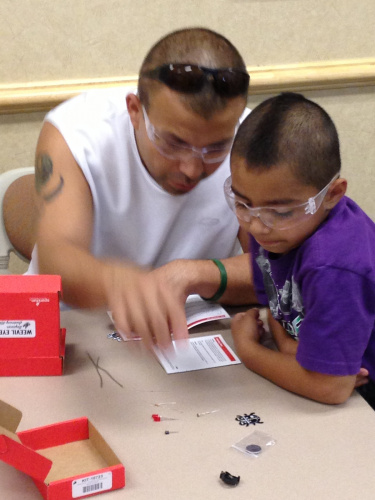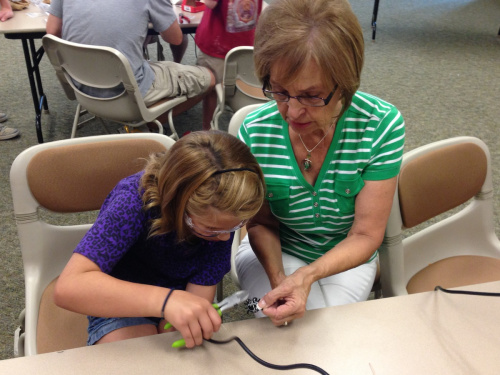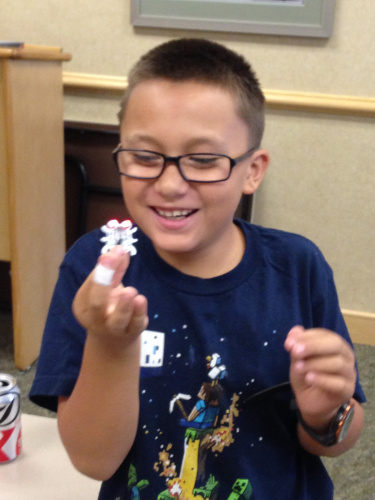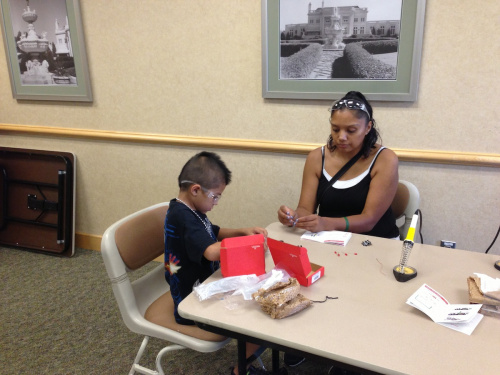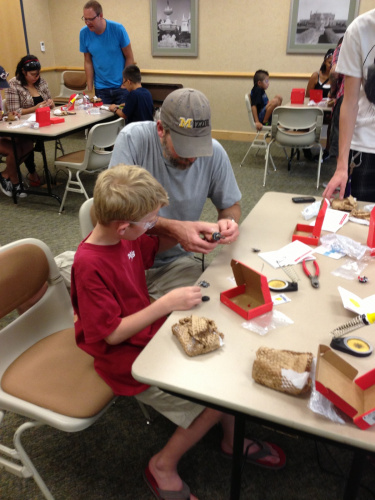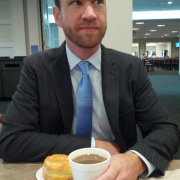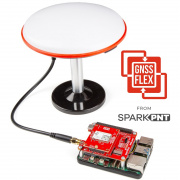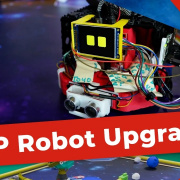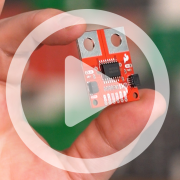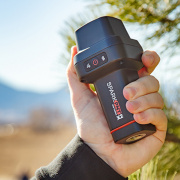SparkFun and Jefferson County Libraries
We collaborated with the JeffCo library system to institute a makerspace program!
Late last year, after a series of successful workshops on the road - in particular a staff training day at the Los Angeles Public Library - Jeff (one of our educational outreach coordinators) started thinking about how to bring SparkFun's educational efforts home to Colorado. He reached out to the Belmar Library in Lakewood, CO, and asked if they might be interested in a collaborative program that would bring embedded electronics and prototyping tools into the library system.
The idea behind the collaboration was two-fold; it would serve as a way to provide open, equal community access to tools and kits that might otherwise be out of reach, and it would offer libraries a way to upgrade their relevancy as a centerpoint for large-scale literacy, in a world where books are losing currency to emerging tech & new generations. The leaders of the Jefferson County libraries were extremely enthusiastic about the program, so we set out supplying Belmar - the first of four JeffCo libraries to adopt the makerspace-model pilot program - with SIKs and other kits, as well as training, to get them set up to offer the same tools and classes to the public.
So! We're excited to announce that MakeSomething, the new collaborative spot at the Belmar Library in Lakewood, CO, is about to host its second workshop this Saturday, August 17 at 10 a.m.! The workshop will be Soft Circuits, taught by Beverly Ball, art and welding teacher at the Denver Academy. The first lab, a soldering class with the WeevilEye on July 13, was a huge success. Experts from The Concoctory were on hand to help out, and the young attendees were super enthusiastic! To find out about future MakeSomething events, or to register for a workshop, visiting the Jefferson County Public Library's events page or contact Chandra.Jones@JeffcoLibrary.org or Leslie.Bonato@JeffcoLibrary.org.
Chandra and Leslie have been an enthusiastic and integral part of getting this program up and running, and they recently were kind enough to speak with us about the program and how it figures into their vision for the future of libraries.
Can you tell us a little bit about your background in education and the institution you are involved with?
Leslie: I do not have a background in education but I do work for the Jefferson County Public Library, and our mission is to provide life-long learning to our community. This program supports our mission by providing information and tools to the public to assist them in personal and professional growth.
Chandra: I've worked in libraries since high school, and have had every job from putting away books to managing a library. Right now I'm the teen librarian at the Belmar Library, so I work with middle- and high-schoolers to help with their research, homework, and finding fun books to read. The Belmar Library is part of Jefferson County Public Library. JCPL is embarking on an exploration of new ways to connect people and information, and MakeSomething is one of our first big projects.
What is your experience with electronics? How were you using electronics in the JeffCo library system before the MakeSomething space?
Leslie: I have no prior experience with electronics. However, I am curious how things work and I have been known to fix my own appliances, car, etc. The current use of electronics in JCPL is limited to computers, electronic resources, etc. - it's completely consumer based.
Chandra: I'd actually just discovered SparkFun a few months before Jeff approached our library to work on this. I don't have any formal experience with electronics, but love playing with gadgets and figuring out how to improve on things. I've worked with new electronic products in libraries a lot and have always wanted to be able to make them better. JCPL has tried incorporating electronics into library services for many years. Some things have been huge improvements for patrons, like self-check machines and automated returns. Other things have brought new access to patrons, but have been more of a struggle, like e-books. They're great once you have it all set up, but it can be a struggle for the patron to get to that point on their own. I'm really excited for the new relationship MakeSomething will create between electronics and patron; instead of being an end-user, maybe our patrons will create the next new device we use!
How will access to these tools function (projects, classes, check them out, collaborations, etc)? What was the inspiration for incorporating embedded electronics tools into the library system?
Leslie: We will be hosting open labs, workshops and circulating SparkFun Inventor's Kits and MaKey MaKeys just like we do with the regular collection. We are currently collaborating with The Concoctory, and they will be teaching at some of our workshops. Our goal is to have a combined space that will encompass both the engineering aspect as well as the traditional arts and crafts. The ultimate collaboration would be between patrons - a melding of both science and art. Our space is called MakeSomething because we want it to reflect both the engineering and arts & crafts aspects.
Chandra: Workshops will have to be sign-up only, as some things just don't work when there are huge groups. Other than that, open labs and use of the space will be open as often as staffing and volunteer hours allow.
What is the ultimate goal of having these materials accessible?
Leslie: To support the mission of life-long learning. To get patrons excited about making something and to learn more about the things we consume.
Chandra: I think of it as the logical next step for libraries. We already empower people to access whatever information they're seeking. Now we can give them the literal tools to bring the information to life. It's also about literacy. Libraries have always considered helping people learn to read as a core service, and now, in order to be a successful participant in many parts of our society, it's also really important to be able to understand how your computer works, what happens to your personal information when you share it online, and why you shouldn't microwave a fork.
Have there been any unforeseen issues when preparing to offer these materials to the public (learning curves, available trainers, resistance to adopting new tech, etc.)?
Leslie: Not that I have seen.
Chandra: The only issues I've run into are the abundant enthusiasm from staff and my own overabundance of ideas. Honestly, it's been amazing thus far. I'm sure once we launch to the public, we'll hit snags here and there, but I'm excited to learn from them. Every single business and person we've approached to participate has said yes immediately and enthusiastically, and I'm thrilled that MakeSomething is already being supported by the community. I expected it would be at least six months before we'd meet success when seeking partners.
Have you seen any other institutions offer similar materials in a way that is inspiring to you?
Leslie: Many libraries are implementing makerspaces but I personally have been inspired by the commercial retailers, places like the FACTORY and The Concoctory.
Chandra: Leslie and I visited local makerspaces while we were figuring out what we wanted to do, and the local make/hack/craftspaces all had elements that I wanted to incorporate. The feeling of community at Fancy Tiger Crafts and the rapid process from idea to retail at SparkFun are both ideas I return to often as we go forward. When I read about The Concoctory in an article in Westword, I immediately sent out many emails smothered in exclamation points and visited them the next weekend. They put into action exactly what I'd been struggling to put into words until then. Mar Williams, one of the owners, told me that she was inspired to explore electronics because, as an artist, she was seeking ways to express her ideas. And that's exactly what I was trying to say myself, that electronics and crafting are not necessarily things a person may want to do just to do, but that there may be tools in those fields that would enable them to go further with the things they are excited about. An oil painting with stars that really twinkle, or a prototype in an appealing color might be just the thing a person needs to create, but couldn't figure out how to until now.
Why do you believe providing access to electronics in the library system is important, and what advice would you give other educators/library administrators who want to use electronics in their facilities?
Leslie: I have to admit, I had a lot of hesitation when my library manager asked Chandra and I to implement this program. Most of the conversation online about libraries and makerspaces was centered around 3D printers and my initial reaction was, 'Oh another cut-and-paste library program - if library A is doing it, then library B better do it as well.' However, it was my tour of SparkFun and working with Jeff Branson that really got me excited and started my creative juices flowing around the potential of providing access to electronics in libraries. _ _Once again, the whole concept supports the mission of the library and technology is the new literacy and we need to embrace that as importantly as we do books.
Chandra: My personal mission as a librarian is to empower people to do the things they want and need to do. I don't believe libraries need to teach and provide everything a person might seek in their lives, but I think we've always been an institution that recognizes gaps that aren't being filled and fills them. Access to electronics, experts, and advanced art supplies are things that many people can't afford on their own, but, by bringing together local agencies, the library can help people explore bigger ideas. I'm no expert, but I'm in a perfect place to reach out to local businesses, educators, and students, and bring them together to build a community that hasn't existed in the area. As for advice to other educators/library administrators, I have to first say that I'm certainly no expert, but that's sort of the point. Find people who are excited to try something new, then empower them to try it and see what happens. Spend a little money, find some people who know what they're doing in your community and put them in a leading role, glue some stuff together and take some things apart. Failure means you're doing something right. If you never fail, you're not perfect, you're probably just not trying much.
Can you share your personal views on the shifting roles of librarians in the face of accelerating technology?
Leslie: I believe libraries will continue to play a central role in providing free access to information and ideas but the format will be evolving more rapidly than in the past. Librarians will need to be proactive and visionary in how they implement new services to patrons. We can no longer be institutions that hold onto tradition with feet firmly planted.
Chandra: Public libraries have always been about creating an enlightened population, so that we can all participate in our communities and government in productive ways. Providing books has been one way we've tried to do that, and now helping the public navigate new technology is another. Ten years from now, maybe our role will be something different in the day to day, but that enlightened population will always be the point.
Thanks Leslie and Chandra; we can't wait to see what unfolds at MakeSomething!
